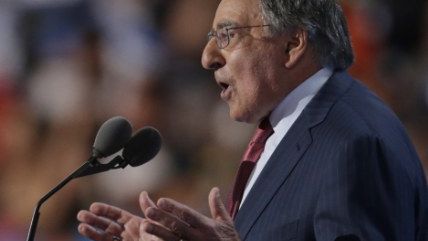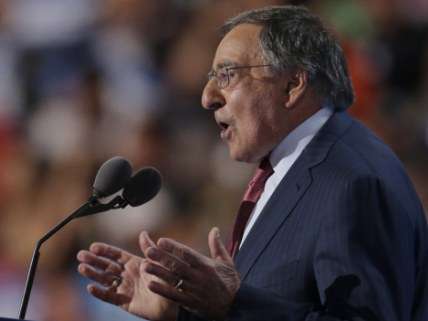Democrats Seem to Want to Forget Obama's Role in Our Surveillance State
It wasn't just one party who set up a system Trump could use to snoop on his enemies.


Anti-war Democrats found their voices again, albeit briefly, when former CIA Director Leon Panetta spoke on behalf of Hillary Clinton at the convention last night. A large pack of delegates (likely Bernie Sanders' supporters) attempted to drown out part of Panetta's speech—which attempted to present Clinton as the choice to take on terrorists—with chants of "No More War."
They were subsequently drowned out by chants of "U.S.A." by other delegates, which made the whole thing a little bit surreal. That President Barack Obama originally defeated Hillary Clinton in part by promising peace as a counter to her hawkishness is now lost. Obama himself mentioned bringing soldiers home from war zones during his speech last night, gliding right past our continued long-term military presence in these countries we were allegedly leaving.
Part of Panetta's aim in his speech was to hit Donald Trump for his comments that he hoped that the Russian hackers who are being blamed for releasing damaging emails from the Democratic National Committee had obtained and would release the missing emails from Clinton's private servers. Panetta told the audience to think about Trump asking a foreign country to engage in hacking against the United States to affect an election.
Without, you know, defending Russian hackers penetrating U.S.-based computers, this feels like the soccer-floppiest of all potential possible responses to Trump and the hacking. The only reason the hacked emails could potentially influence the outcome of the election was because it revealed a dismissive attitude by the Democratic National Committee (DNC) toward Bernie Sanders and his supporters, and that information has most certainly influenced behavior at the convention. But I've already written about the nature of this deflection and how ill-advised it is.
The hack and Trump's reckless response to it (he may or may not be joking, but who can truly say?) has brought up a concern that as president, Trump might have the power to indeed hack the emails and engage in surveillance upon his political enemies. He did say that he "wished" he had the power to access Clinton's hidden emails. And we know with certainty now that the National Security Agency (NSA) does have the technical ability to access and read people's emails, even the emails of American citizens. They say they do not actually do so, and indeed, abandoned an email mass data collection system in 2011 (well into Obama's first term) because they could not figure out the technology to separate "metadata" from the actual content of online communications.
So since this whole hack has brought American cybersurveillance to the forefront, it's worth looking at what the Democratic Party's platform has to say about Internet data privacy and security in 2016:
Democrats will protect our industry, infrastructure, and government from cyberattacks. We will strengthen our cybersecurity, seek to establish global norms in cyberspace, and impose consequences on those who violate the rules. We will do this while protecting the privacy and civil liberties of the American people. We will also ensure a coherent strategy across federal agencies by building on the Obama Administration's Cybersecurity National Action Plan, especially the empowerment of a federal Chief Information Security Officer, the modernization of federal information technology, and upgrades to government-wide cybersecurity.
Democrats reject the false choice between privacy interests and keeping Americans safe. We need liberty and security, and each makes the other possible. We will protect the privacy and civil liberties of the American people—standing firm against the type of warrantless surveillance of American citizens that flourished during the Bush Administration. We support recent reforms to government bulk data collection programs so the government is not collecting and holding millions of files on innocent Americans.
We will support a national commission on digital security and encryption to bring together technology and public safety communities to address the needs of law enforcement, protect the privacy of Americans, assess how innovation might point to new policy approaches, and advance our larger national security and global competitiveness interests.
Emphasis added because, uh, what? So the party's official position on cybersurveillance is to just sort of pretend that the Obama administration was not heavily on board with all of this (until Edward Snowden's leaks prompted the administration to treat privacy concerns at least somewhat seriously) and that the Department of Justice under Obama has not been fighting tooth and nail to keep it out of the courts and to keep the protections offered by the Fourth Amendment from being applied. Yes, it is indeed true that the surveillance system was developed under the Bush administration. But it flourished just fine under Obama.
To the extent that Trump as president might have the power to snoop on his enemies, many in the Democratic establishment seem perfectly fine with such a power as long as the right people (by which they mean themselves) possess it. If hackers were to get their hands on Trump's tax returns and release them, would these same folks want a greater emphasis on the risks to Trump's cybersecurity rather than the returns' actual contents? Of course not. I wouldn't be surprised if it were used as evidence that Trump doesn't know crap about cybersecurity (likely true) even in the face of the scandal over Clinton's ineptly handled private servers.
